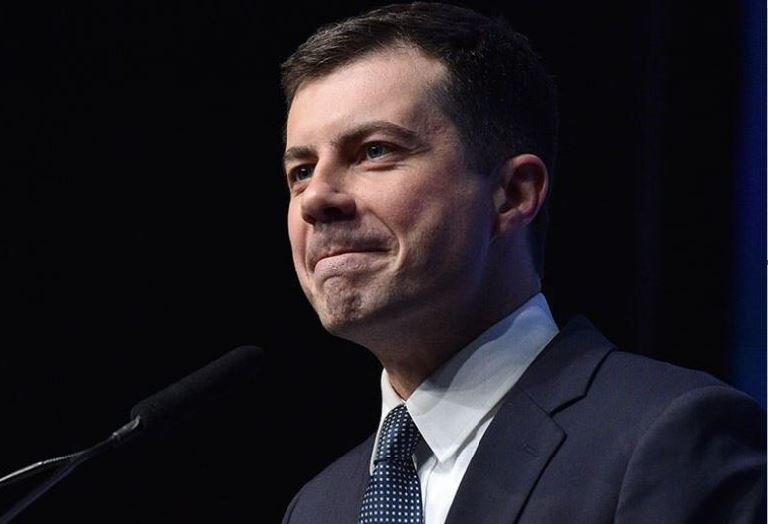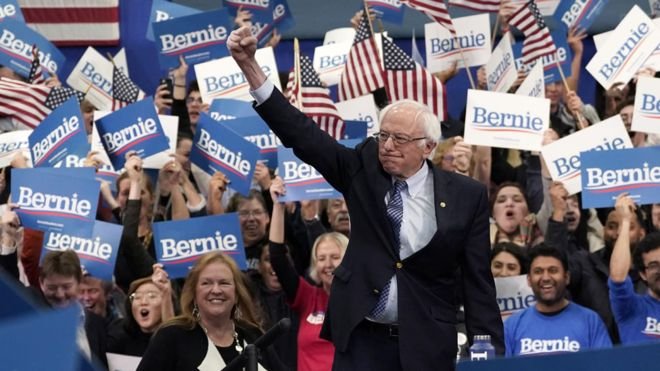Bernie Sanders has narrowly won the New Hampshire Democratic primary contest, a race that also culled the crowded field by two.
The left-wing firebrand won a tight victory over centrist former mayor Pete Buttigieg, who offered a different Democratic vision in the race to take on President Trump in November.
Mr Sanders declared the night “the beginning of the end” of Mr Trump.
Tonight’s victory has sent a powerful message that now is the time to think big, not small.
Now is the time to have the guts to take on the corporate and financial elite of this country.
This is our moment.
Chip in to our campaign now: https://t.co/xKt1PYIt65
— Bernie Sanders (@BernieSanders) February 12, 2020
The race moves next to the Nevada caucuses on 22 February.
Finishing behind the Vermont senator were two moderates – Mr Buttigieg and Minnesota senator Amy Klobuchar, who emerged as a surprise contender by taking third place.
Massachusetts senator Elizabeth Warren and former vice-president Joe Biden – two erstwhile frontrunners – finished in fourth and fifth places.
Technology entrepreneur Andrew Yang and Colorado senator Michael Bennet both dropped out of the race.
Some 280,000 Democratic voters cast ballots in the Granite State on Tuesday night, delivering 26% to Mr Sanders.
What happened in New Hampshire?
With 88% of the vote counted, Mr Sanders, 78, leads Mr Buttigieg, 38-year-old the former mayor of South Bend, Indiana, by only 1.6%, or about 4,300 votes.

Mr Sanders hailed a “great victory” as he thanked supporters from a rally in Manchester, New Hampshire.
“This victory here is the beginning of the end for Donald Trump,” he said, and promised to build an “unprecedented multi-generational, multi-racial political movement” to defeat the Republican.
The result will give Mr Sanders at least eight of the 24 delegates who will represent New Hampshire at the July Democratic national convention, where the party crowns a nominee based on the delegates won.
Mr Buttigieg will get at least seven delegates. Thanking supporters, he warned against succumbing to “a polarised vision” of politics and pitched himself as the centrist to bring new voters into the party.
What had happened last week in the first contest?
The young former mayor led the delegate count going into New Hampshire after winning the Iowa caucuses.
Results there were delayed due to technical problems and the party, as well as several candidates, have demanded a re-tallying of the votes.
Unlike Iowa, New Hampshire’s contest is a traditional primary where voters cast secret ballots that are counted by the state, not the party.
Both states are largely rural and white, and not representative of the larger Democratic electorate.
A question remains over whether the frontrunners who have emerged from Iowa and New Hampshire can attract a broader coalition of voters that includes voters of colour.
Mr Sanders has polled as high as 19% among black voters, but in some polls, Mr Buttigieg has less than 10%.
What were the other stories from New Hampshire?
Ms Klobuchar, 59, posted a better than expected finish following a strong debate performance in New Hampshire on the Friday preceding the vote.
The Minnesota senator, a centrist, capitalised on the momentum and campaigned fiercely in the last few days before the vote, adding stops in three cities between Sunday and Tuesday.
Though her third place finish meant she would only win six delegates, the result invigorated her campaign, giving her momentum to go on to Nevada and South Carolina, the next two states to hold contests.
“Everyone had counted us out even a week ago,” Ms Klobuchar said. “I came back and we delivered”, she declared.
A casualty of the night was Mr Yang, a political newcomer. His quixotic run centred on the promise of a universal basic income and addressing the challenges of automation inspired an enthusiastic, but ultimately marginal, following.
Mr Yang said he was proud of a campaign that had “brought a message of humanity first and a vision of an economy and a society that works”.
Mr Bennet, the Colorado senator, also suspended his campaign. He had not qualified for a debate since August 2019 and had been polling at less than one percent nationally.
Ms Warren, 70, received no delegates, but said she would continue. “Our campaign is built for the long haul and we are just getting started,” Ms Warren said.










